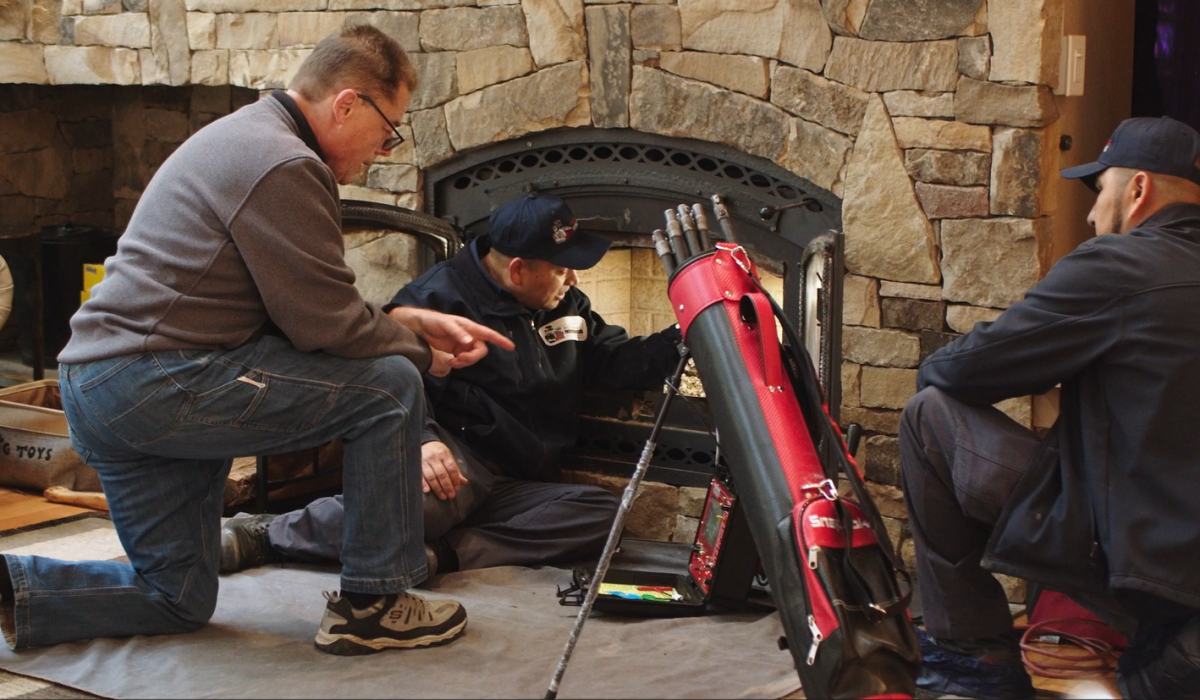- By Cathy Peterson
- Chimney Dangers, Chimney Inpection
- 0 Comment
Why Does My Chimney Smell?
Common Causes and Solutions
A smelly chimney can be more than just a nuisance—it can indicate underlying issues that require attention. Whether it’s a faint odor or a strong, unpleasant stench, understanding why your chimney smells is the first step in resolving the problem. Let’s dive into the common causes and what you can do about them.
1. Creosote Buildup
Creosote is a natural byproduct of burning wood. Over time, it accumulates in your chimney, producing a strong, tar-like odor, especially in humid or rainy weather. Creosote isn’t just smelly—it’s also a fire hazard.
Solution: Schedule a professional chimney cleaning to remove creosote buildup. Regular maintenance ensures your chimney remains safe and odor-free.
2. Moisture and Water Damage
Moisture can seep into your chimney through cracks, an uncovered flue, or a damaged crown. Dampness often leads to musty odors and can even cause structural damage over time.
Solution: Install a chimney cap or repair existing damage to keep water out. Waterproofing treatments can also help protect your masonry from moisture.
3. Animal Intrusions
Birds, squirrels, raccoons, and other critters can find their way into your chimney, leaving behind nests, droppings, or even deceased animals. These materials can create foul odors that linger.
Solution: Have a professional inspect and clean your chimney. Installing a chimney cap with a mesh screen will prevent animals from entering in the future.
4. Negative Air Pressure
Sometimes, your home’s ventilation system can pull air (and odors) down your chimney instead of letting it escape. This is common in homes with energy-efficient designs or poorly ventilated spaces.
Solution: Improve ventilation by opening windows or using exhaust fans. A draft-inducing cap can also help redirect airflow properly.
5. Mold or Mildew
Moisture trapped inside your chimney can lead to the growth of mold or mildew, producing a damp, unpleasant odor. This is especially common in chimneys that aren’t used regularly.
Solution: Address the source of the moisture and have the chimney professionally cleaned. Waterproofing can also help prevent mold growth in the future.
6. Soot and Ash
Even a small amount of soot or ash left behind after using your fireplace can produce a smoky odor, especially in warm weather when the air is more stagnant.
Solution: Regularly clean out the firebox and have your chimney swept at least once a year.
7. Decomposing Leaves and Debris
Leaves and debris can enter your chimney, decay, and produce an earthy or rotting smell. This is common in chimneys without caps.
Solution: Install a chimney cap to keep out debris and schedule annual inspections to ensure your chimney stays clean.
Preventing Chimney Odors: Pro Tips
- Annual Inspections: A yearly inspection can catch potential problems early.
- Use Quality Wood: Burn seasoned hardwoods to minimize creosote buildup.
- Keep It Dry: Protect your chimney with a cap and waterproof sealant.
- Regular Cleaning: Even if you don’t use your chimney often, schedule regular cleanings to prevent odors.
Call Potomac Chimney & Masonry Services!
If your chimney is producing unpleasant odors, don’t wait for the problem to worsen. At Potomac Chimney & Masonry Services, we specialize in diagnosing and resolving all types of chimney issues, including odor problems. With over 20 years of experience, our family-owned business is here to provide top-notch service you can trust.
Contact us today for a free consultation and let us help you enjoy a fresh, odor-free home!
By addressing the root causes and investing in regular maintenance, you can eliminate chimney odors and keep your home smelling fresh and inviting.

